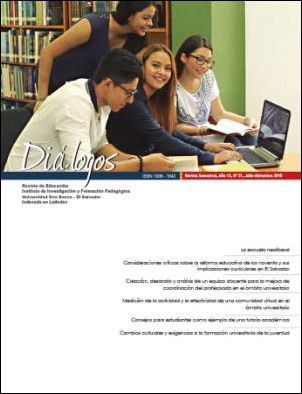Cultural changes and demands on university education of youth
DOI:
https://doi.org/10.5377/dialogos.v21i1.14712Keywords:
Juvenile criminal law, preventive system, educational principleAbstract
One of the main features juvenile criminal justice presents with regard to the adult law, is the type of response provided to the offender. The criminal law of the adolescent assumes that the preventive basis plays a protagonist role, privileging the educational intervention over the retributive one. This special positive prevention is understood in terms of socialization of adolescents with socio-educational aims to holding penal self-responsibility, orienting education toward living his life within society. In this paper the author develops the validity of the preventive system proposed by Don Bosco which is implicitly embedded in the contemporary juvenile penal law and in human right organisms. These organisms argue that the best way to face juvenile delinquency is through educational and social policies and not by imposing custodial sanctions, which is the last resource and only for the shortest time.
Downloads
158

